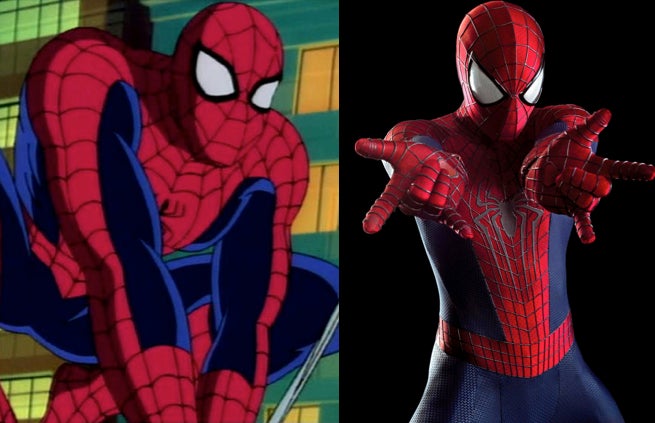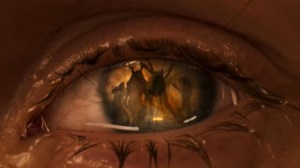For children of the nineties, there’s no clearer voice to Spider-Man than Christopher Daniel Barnes’. Barnes, who voiced Peter Parker and Spider-Man on Fox Kids’ Spider-Man: The Animated Series from 1994-1998, left an undeniable mark on The Wall Crawler. To many fans, Barnes is “their” Spider-Man; that singular voice in their heads whenever they read a Spider-Man comic.
Videos by ComicBook.com
As one of Peter Parker’s biggest champions, Barnes has a lot to say about the character’s current state of affairs, especially when it concerns Marvel Studio’s and Sony’s recent movie merger. Below, Barnes talked to ComicBook.com about Spider-Man’s foray into the Marvel Cinematic Universe, his current voicework on Ultimate Spider-Man, and who he’d personally like to play in the Marvel Cinematic Universe (Spoiler: It’s not a Spider-Man character).
What do you think of Sony and Marvel Studios’ plan to bring Spider-Man into the Marvel Cinematic Universe with the Avengers?
I love it. I love the Marvel Universe, and that they’re bringing it to the big screen in such an interwoven manner. One of the great things about the mythology is that, well, it is a mythology. It’s a whole world. So it’s great to see that these once-standalone stories are now weaving together into this big tapestry that’s rich, myriad and fun.
And what makes the Marvel Universe so fun?
It gives us angles to explore our somewhat-boring universe in fantastical ways. The purpose of mythology is to have the human experience written large. We can look at all the dilemmas we deal within our lives, and then we can see them projected onto this canopy of intensity and amplification. Mythology is the human condition through an amplifier and under a microscope simultaneously. It’s a better way to look into our world.
That’s why I like connecting all of these story lines. It enables us to do that. Look at the way Iron Man and Captain America interacted in the last Avengers film. That was really foreshadowing Civil War, which of course, is about our society.
Interesting. What do you think about Spider-Man receiving his second cinematic reboot in under 10 years?
I think it demonstrates Spider-Man’s appeal and enduring legacy. In many ways, in the Marvel Universe, Spider-Man is a bridge between the boy and the man, the geek and the stud, the loner and the joiner. Spider-Man converges all of these things. I think that’s one of the things that’s made the character so interesting. Even going into Civil War, I think that’s one of the reason’s he’s so conflicted by [the superhuman registration act]. He represents the Marvel universe’s conscious. He bridges so many qualities. I think Spider-Man embodies the inner archetype of conflict maybe more than any other character in the Marvel Universe.
So in terms of rebooting him, I think it’s great that they’re allowing the character to expand in this new way. Of course, there’s always the danger of character saturation. The marketing can overwhelm people. Once you have too much of one thing, people get frustrated and turned off by it. But I think that they way they’re doing it, especially by bringing Spider-Man into the greater Marvel Universe, will add a new dimension that will have some new appeal.
What new dimensions do you think the Marvel Cinematic Universe will add to the Cinematic Spider-Man?
I think that the films have pretty much dealt with him as an individual in his adolescent phase, in the sense that he’s consumed with his internal dilemmas and how they affect his life. But I hope we’ll start seeing Spider-Man deal with society and group dynamics within the Avengers’ larger scope. That represents a maturity of the character, and represents the natural progression of human consciousness from the “I,” “Me,” “My,” to, “Woah, I’m part of this larger community. What I do impacts a much greater area.” Of course, the whole idea of a superhero is that the superhero has the greatest influence. He is “super” because he has power that transcends your Average Joe.
That’s what a modern-day superhero is. It’s that wholesome saga where a character is touched by some divine power that makes them more important. That power makes them more relevant, because they’re entering a greater scope. I think we’ll see that evolution in Spider-Man.
Interesting. And who do you think should play the next Peter Parker and Spider-Man? Any advice for them?
No certain actors come to mind. I think that each avatar of the Spider-Man diety needs to be chosen from among people who really understand the age in which he’s being portrayed. And now that I’m older, I feel like I did a good job at what I did during my time, but I also feel like that role is something for people who are closer to the spirit of his age. And there’s always little differences, little variations, and I think that’s very important.
But for whoever they pick, I’m sure that as long as they stay true to the archetype and spirit of what Spider-Man is, they’ll do a fantastic job.
Cool. So if you could pick any role in the upcoming Spider-Man movie, which character would you like to play?
I actually find my interests gravitating more towards Doctor Strange. I would like to be some sort of villain in the Doctor Strange mythos, like Dormammu or Nightmare. You know, some sort of interdimensional power. The filmmakers could hook up all of the motion capture tech on me, and I could span dimensions, open portals, and cast bolts of mythic energy with some grandiose scheme.
Well, that would be pretty cool.
[Laughs] Yeah, I think so too.
So no particular Spider-Man character interests you? You’d rather just do a larger Marvel Universe villain?
I think I’d like to do a larger Marvel Universe villain. I voiced Electro on the current Ultimate Spider-Man cartoon, and I loved it. I did Spider-Knight too. I’ve had so much fun within the Spider-Man realm, but I think as the Spider-Man character grows and becomes integrated into the greater Marvel Universe, I think I would like to do the same thing.
That’s understandable. So how is it working on the Ultimate Spider-Man series? How would you compare working on this current series to the nineties one?
Well, as a famous man once said: “You either die a hero, or live long enough to see yourself become the villain.” So, the villain is the direction that I seem to have taken. But it’s a blast. I think that in some ways you learn more from the villain than you do from the hero. It’s fascinating and fun. And Electro is a great character, because there’s something sort of thuggish about the old school version of him.
Lightning Bolt Mask Electro?
Yeah! If you look at the old school comics, Electro is an archetype of what happens when you give too much power to someone with a big chip on their shoulder. He’s not a super villain. He’ s not the mastermind behind everything. There’s something sort of thuggish and broodish within him. He has this unhealthy sense of entitlement, which makes him a great character to play.
And back when you were playing Spider-Man himself, were there any “team-ups” with a fellow voice actor that you really enjoyed?
I remember that I had a great time with Mark Hamill, who voiced Hobgoblin. And I remember watching him in the booth and thinking, “This guy’s f***ing crazy” [laughs]. He had so much energy and vitality, and I had a great time working with him.
Back when you were doing Spider-Man: The Animated Series, that cartoon was probably one of the character’s highest budgeted and marketed entries in another medium. At the time, did you think that Spider-Man would receive not just a feature film, but multiple blockbuster franchises within the next few decades?
Absolutely. The mythology is so powerful, and it just speaks to people. There’s a reason that comics have endured for decades. They speak to us. I was at a panel recently, and I talked about how we don’t read Homer’s The Illiad or the Odyssey anymore. We don’t read Bullfinch’s mythology. Most people don’t read the poetic or prose Edda.
But they read comics. And that just speaks to something within our species, as the archetypes flow through us. They take different forms for different times, because they sing the same universal truths and human experiences to us. So I had no doubt that Spider-Man would go big-screen and become a multi-million or billion dollar franchise. He’s an archetype that seamless. He’s the quintessential hero’s journey in so many ways, especially in an age of inner conflict. The 20th and 21st centuries have really been characterized by inner conflict, what with the rise of technology. Spider-Man embodies that. It’s why he’s part science geek and part strongman superhero. He bridges these things.
Great points. Before we go, are there any other projects you want to talk about?
I basically do voiceover work these days. I don’t really do acting anymore. I left the business, but I still do voiceovers when they call me in. I have a lot of fun with that. I also write short stories, but they’re pretty dark and twisted [laughs]. I published my first short story, called “The Warrior,” on Amazon just for the hell of it. If people want to read it that’s cool, but no big deal either way.









